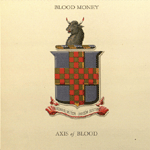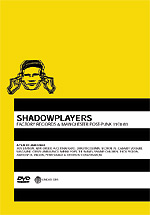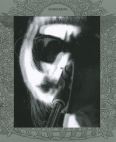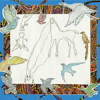- Lucas Schleicher
- Albums and Singles
Utech
In fact, plenty of American music has always been popular overseas. Many of the greatest jazz musicians in history enjoyed more success in Europe or Japan than they ever did in America during their lifetime. Swing music was powerful enough to be outlawed in some countries and the blues came back to this country after the British got ahold of it and put some fuzz in its bones. American music is, regardless of popular and rebellious opinion, is rich with history, power, and influence. It's no wonder, then, that Tetuzi Akiyama's focus on this release from Utech sounds more American than Japanese, despite the "improvised music from Japan" sign hanging from Akiyama's website.
The music itself isn't quite up to par with its influences, the work of several classically minded guitarists putting their fingers and sweat to the fret-board of the blues and traditional folk songs. Names I never thought I'd see in popular culture of any kind are suddenly popping up all over the place: John Fahey might be more referenced on indie websites than Yo La Tengo these days. Yet, many of those references fall flat. In some way or another, the link between Fahey and the 21st century has a missing link. This isn't true in Akiyama's music. Akiyama's music is entirely instrumental, much like most of Fahey's work, and it relies on space as much as it does harmony and melody. The recording on this disc is absolutely terrible, filled with crackle and hiss. But behind it all is the very professional, very trained work of Akiyama's fingers. They expertly dive up and down the guitar, exclaiming bouts of dissonance and beauty in short phrases and circular wanderings. The only problem is that Akiyama isn't the writer or, apparently, the historian that his influences were. The result is that this solo guitar performance falls a bit flat. Half way through the disc a creeping feeling comes over me, suggesting that Akiyama's already played this part somewhere in the last 20 minutes.
It is interesting, though, that Akiyama has chosen to play a distinctly American brand of solo guitar. The rest of the world is filled with musicians, experimental and otherwise, that take their influences from obscure names of all parts of the world. This may be the first time I've heard a musician with a background like Akiyama's that expresses vividly an interest in American history, in the decided twang and warble of this country's guitar, its most favorite instrument. Akiyama's techniques are as varied as four or five different guitarists from the past, using non-rhythm and non-melody to counter the rolling beauty and perfect unity of rhythm and melody that pop up on the first half of this disc. In any case, this is very true to a lot of blues guitar and jazz performance I've heard and I'm happy to hear it. The history of blues, folk, and jazz is a weird one, a little mystery that most citizens aren't even conscious of. It's as interesting as any mystery I've ever heard of and its sounds are so exclamatory that one can't help but breathe in the dust of age when listening to it even now.
So while I understand all the awe that comes with discovering new music from new places (I love the sound of the oud and the way northeast African and Middle Eastern musicians play it), perhaps everyone that thinks they love music should take time to discover this stuff in the same way the rest of the world did almost 100 years ago, now. Try listening to the blues with AC/DC in the way, try getting through to folk music minus this new weird stuff that seems so popular. Akiyama has revived its spirit, complete with crackling 78 quality. It's a haunting effect in some ways, to hear the guitar through this kind of noise. It brings to mind old techniques and communal communication of a sort I'm not sure any of us are familiar with. Like I said, this music might be the greatest treasure America has ever had and right now, this country could use a few treasures that aren't the legacy of some violent act or the inheritance of stolen property.
Read More
- Lucas Schleicher
- Albums and Singles
Gold Standard Laboratories
Had the band stuck to the kind of troubles the song "Monday" confronts, they might've penned a lyrically haunting record. It starts well enough, a tirade against the repetitive machine of capitalistic hunger and redundant reproduction, but it fizzles out at the end, a poetic cry on a song that doesn't need poetry to make it relevant. All in all, that's the problem this band has; they try far too hard to make a point that could be made more subtly, convincingly, and artistically if it weren't trying so hard to be an essay by George Lakoff or Howard Zinn. The band must not know their material as well as they think they do, the above song offering contradictory and confusing anecdotes on living the life of an ant and eventually killing the point they set out to make. "Where for art thou?" is no way to end a song like this.
I'm not disagreeing with everything the band has to say, but I scrunch my nose up at the way they're going about it. "Vehicular Baptism" sounds as though it might take a nice stab at American dependence on vehicles and fuel, but it reshapes itself into a nonsense piece of anti-something screaming about China, Iraq, missles, and God knows what else. Every song keeps this lack of rigor the standard, slowly eroding whatever it was about the band that endeared me at first.
Perhaps the thrashy, malevolent guitars are attractive at first, but over time they wear thin. It's nothing I haven't heard before: a harder punk tempered by the steel of some harder metal. There's nothing particularly exciting about any of it. This is a band composed of the traditional rock foursome: a guitar, a bass, a drum kit, and front man that stands in front of everyone and sings. Not that such a group couldn't write something exciting, but Year Future certainly didn't. The cover of Dead Can Dance's "Black Sun" is actually pretty nice. It's the only point on the album where the band doesn't sound like it is struggling to maintain a facade of hardcore, political, punk nonsense.
Read More
- Administrator
- Albums and Singles
 Artist: Blood Money
Artist: Blood Money
Title: Axis of Blood
Label: Killer Pimp
Format: CD
Catalog number: PIMPK003
Release date: August 8, 2006
Track list:
1. Russolo (8.04)
2. Delillo (10.23)
3. April (10.37)
4. Following Thunder (7.55)
5. Jet (21.40)
Extras: CR-ROM track with live videos from May 11, 2006, T.T. the Bear's
Place, Cambridge, Mass., to play on computers and video iPods.
Blood Money is: Ken Ueno - vocalist; Jon Whitney - rhythm composer; Tom
Worster - modulator
Blood Money puts experimental music back into a rock music context where
the onslaught of noise can be expressionist rather than intellectual,
where music can be enjoyed simply as entertainment, and where musicians
are allowed to be rock stars. An award winning composer and vocalist
combines extraordinary extended expression with macho beats and extreme
oscillator abuse. Simultaneously channelling the sprit of Throbbing
Gristle, the mayhem of Pan Sonic, the terror of Diamanda Galas, and the
other-worldly artificiality of Xenakis, Blood Money delivers at the
intersection of metal, noise, electro and experimental. Axis of Blood, a
virtuosic feat of derring-do, will satisfy the most rabid of thirsts.
A former ski patrol and West Point cadet, Ken holds degrees from Berklee
College of Music, Boston University, the Yale School of Music, and a Ph.D.
from Harvard University. He is a co-founder/co-director of the Minimum
Security Composers Collective and is the vocalist in the experimental
improvisation group Onda. Currently, he is an Assistant Professor and the
Director of the Electronic Music Studios at the University of
Massachusetts Dartmouth. As a vocalist, he sings sub-tones, multiphonics
and overtones and practices circular breathing techniques. Awards and
grants that Ken has received include those from the American Academy in
Rome, the Fromm Music Foundation (2), the Aaron Copland House, Meet the
Composer (3), the Belgian-American Education Foundation, Sonic Circuits X,
First Prize in the 25th .Luigi Russolo. competition, and Harvard
University. Current projects include a multimedia theatre work for Kim
Kashkashian and Robyn Schulkowsky (a companion piece to Berio.s Naturale);
and a chamber orchestra work for the Netherlands Youth Orchestra to be
conducted by Stefan Asbury in the summer of 2007.
Ensembles and performers who have played Ken.s music include the Bang on a
Can All-Stars, eighth blackbird, Frances-Marie Uitti, the Boston Modern
Orchestra Project, the American Composers Orchestra (Whitaker Reading
Session), the New York New Music Ensemble, the Prism Saxophone Quartet,
Relâche, the San Francisco Contemporary Music Players, the Pro Arte
Chamber Orchestra, Dogs of Desire, the Orkest de Ereprijs, and the So
Percussion Ensemble.
Jon Whitney has played various instruments in various bands since his
teenage years but is far too embarrassed to own up to being in any of
them. He's more known for being a DJ, VJ, web developer, video documentor,
aspiring screenwriter, festival curator, teacher, professional driver, and
founder of Brainwashed.com. He has infrequently performed in New England
and Canada as R since 2000.
Tom Worster's first solo experimental music performance took place in
1984, the same year he first heard the Arditti Quartet perform Xenakis and
one year before he bought his first Derek Bailey record (Notes, Incus).
After that gig he kept his music under wraps until 1997, when he began
performing and recording as the fsb. He is also hosts a weekly radio
program in Boston called New Adventures, rides bicycles a lot, and holds
both ambitions for the 2006 Boston-Montreal-Boston 1200k Randonnée and a
day job as communications system architect.
Read More
- Administrator
- Albums and Singles
FACTORY RECORDS & MANCHESTER POST-PUNK 1978-81
a film by james nice
LTM are proud to present Shadowplayers, a feature-length documentary tracing the early history of iconic Manchester record label Factory Records between 1978 and 1981. For screening enquiries click here.

Cat No: LTMDVD 2391
The Facts and fictions are explored through candid interviews with 22 key participants, including Anthony H. Wilson (founder) and Peter Saville (designer), as well as musicians including Peter Hook (Joy Division/New Order), Vini Reilly (Durutti Column), Simon Topping and Martin Moscrop (A Certain Ratio), Chris Watson (Cabaret Voltaire) and Howard Devoto (Buzzcocks/Magazine).
Other interviews include members of Section 25, Crispy Ambulance, The Names, Minny Pops, Swamp Children and Thick Pigeon, as well as other eyewitnesses and insiders such as Richard Boon, Annik Honore, Lindsay Reade, Richard Jobson, Graham Massey and Killing Joke.
The film runs for 2 hours 15 minutes and is divided into 19 chapters, covering subjects such as The Factory Club, sleeve art and graphic design, genius producer Martin Hannett, the riot at the Joy Division concert at Bury in April 1980, the Factory Benelux connection, the tragic suicide of Joy Division singer Ian Curtis, the beginnings of New Order, and the decline of the post-punk culture in 1981.
Shadowplayers is based exclusively on new spoken word interviews, with soundtrack music by Section 25 and New Order, and rare images and graphics. The cover art is based on the first Factory design (Fac 1) by Peter Saville from 1978.
The DVD is available as a Region 0 NTSC disc. DVD extras include individual profiles for each interviewee. To read auto-interview with film maker James Nice click here.
SHADOWPLAYERS: detailed content (19 chapters):
1. USE HEARING PROTECTION - The Factory Club, May 1978- April 1980
2. A FACTORY SAMPLE - 2x 7" single (Fac 2) released January 1979, featuring Durutti Column, Cabaret Voltaire, John Dowie and Joy Division
3. FACTORY FOREMEN -Five heterosexual directors: Tony Wilson, Alan Erasmus, Peter Saville, Rob Gretton and Martin Hannett.
4. UNKNOWN PLEASURES - Joy Division's debut album (Fact 10) was released in May 1979, produced by Martin Hannett
5. ZERO - Martin Hannett, record producer
6. SITUATIONIST GROUP - Vini Reilly and The Durutti Column
7. THE THIN BOYS - The first single by A Certain Ratio, All Night Party (Fac 5), appeared in May 1979. With no drummer
8. LARRY AND VINNY - Section 25 are from Blackpool, Lancashire
9. GET IN THE VAN - Heads, tales, Cocks and Jokers on the road
10. RUE DE MANCHESTER - Joy Division and Cabaret Voltaire play Plan K, Brussels, 16 October 1979
11. THE RAINBOW - On 4 April 1980 Joy Division played two London venues, The Rainbow and The Moonlight Club
12. FACTORY BENELUX - Friends in Belgium (and Holland)
13. DISORDER - Bury Derby Hall, 8 April 1980
14. IN A LONELY PLACE - 18 May 1980. On the eve of Joy Division's first American tour, Ian Curtis hangs himself at home in Macclesfield
15. BENEATH THE PAVEMENT - New Order debut at The Beach Club, Manchester, on 29 July 1980
16. OF FACTORY AMERICA - New Order and A Certain Ratio in New York, September 1980
17. FUTURISTS - The first New Order album, Movement (Fact 18), was released in November 1981
18. CHOIR BOYS - Schoolboy lyrics and timbales: Simon Topping and Vini Reilly
19. LIKE PUNK NEVER HAPPENED - 1981: new pop, old ways
Read More
- Administrator
- Albums and Singles
 This double live album is another impressive release from Keiji Haino. For this concert he was joined by Sitaar Tah! (a twenty strong sitar orchestra) and a throat singer by the name of Fuyuki Yamakawa. It’s as good as it sounds.
This double live album is another impressive release from Keiji Haino. For this concert he was joined by Sitaar Tah! (a twenty strong sitar orchestra) and a throat singer by the name of Fuyuki Yamakawa. It’s as good as it sounds.
Animamima is, as expected, mainly a drone with Haino adding to the foundation of sitars with his hurdy gurdy, sruthi-box and tanbur (all electric). He also solos over the many drones on a flute. For the first half hour it all sounds very beautiful. Haino uses a limited amount of effects (mainly delay and echo) on his instruments to build up a powerful sound. The hurdy gurdy is overwhelming at times, when Haino is in full swing on it the music becomes so dense it is almost a singularity. The addition of Yamakawa adds to this density. His deep chants sound like they are coming from another dimension; subtle changes in his voice make it sound like he’s being tuned in from a great distance away.
As the performance progresses it becomes more dissonant and chaotic. Towards the end of the first disc, Sitaar Tah! play as if their lives depended on it: the sitars are plucked franticly and the previously pleasant mood becomes urgent and disorientating. Haino begins to wail and it sounds absolutely haunting. There is a slight amount of distortion that could be from the recording or direct from Haino’s mic that adds to the effect. The end of the first disc brings me to my only major criticism of Animamima which is that it’s a shame that the concert is split across two discs. I know this can’t be helped given the limitations of CDs but it does interrupt the flow of the performance.
The second disc is noisier than the preceding disc. The hurdy gurdy returns with Haino playing as high as he can (aided by a pitch shifter from the sounds of things). The shriek cuts through the music and my ears like a rusty blade. It’s hard to hear let alone concentrate on anything else. This assault dominates the first half of the disc and Sitaar Tah! have a tough time making themselves heard over Haino. It sounds splendid and acts as a worthy counterpoint to the first half of the performance. The second half of the disc returns to the blissful drones of the first disc as Haino steps back and allows Sitaar Tah! to have more space.
I can’t finish this review without mentioning Stephen O’Malley’s gorgeous design for the packaging. An intricately embossed jacket wraps around a simple booklet with a window in the front of the jacket to show a black and white picture of Haino. The inside has a beautiful blurred, black and white portrait of Sitaar Tah! in action. It’s a simple but elegant design that suits the music it accompanies. As a whole, Animamima is a great release and reconfirms my view that Haino with a selection of weird instruments (including his voice) is far more exciting than Haino with his guitar.
samples:
Read More
- Administrator
- Albums and Singles
 Ex members of Windsor for the Derby contribute to this pretty little single, the first from their debut album Fear Is On Our Side: the result is a number catchy enough to have me singing along even though I can't find the lyrics to the song anywhere.
Ex members of Windsor for the Derby contribute to this pretty little single, the first from their debut album Fear Is On Our Side: the result is a number catchy enough to have me singing along even though I can't find the lyrics to the song anywhere.
Secretly Canadian
How a name that sounds so emo could get my attention and, furthermore, keep me pressing the repeat button on my CD player is a paradox in and of itself, a virtual rip in the space-time continuum that'll probably leave string theorists in a tizzy for years. On the other hand, once the disc is in my player and spinning, it's a little difficult not to get drawn into this quartet's music. It's not often I find joy in prototypical rock groups. Most of them imitate a style or a period of music so closely that the result is too nostalgic: why have a copycat when the real thing is still available? The ones that don't imitate someone or something often sound dull, reaching for that all important radio market without giving much thought to their music. So it has synthesizers and a drum machine in place of a guitar and percussionist, that's no excuse for ignoring the importance of good songwriting. It isn't edgy and wild because it mimics so much of the eighties. That's right, this has happened in the past.
So, the thing that makes (deep breath) I Love You But I've Chosen Darkness' According To Plan single so great has nothing to do with the fact that it might be described as marginally retro. Interpol got this treatment, but were taken so seriously that I had to puke after reading reviews of their albums, knowing that they just weren't worth the goddamned hype. In the interest of being honest, then, I've chosen to mock this band's name and emphasize the fact that the first song, the only track on the album from their debut, makes me want to dance. It makes me feel like I've just done enough ecstasy to kill a large bovine creature outright. It has all the makings of a tune that will make it to the radio, but none of the trappings that make such songs (especially with the way radio is most places) so drab and laughable. Oh look, another band has a hook I can predict ten seconds into the song! No, I Love You... really does love it's fans, no matter how "dark" they think they are with all those ringing synthesizers and chimey pianos.
"According To Plan" might belong in a club, should probably be remixed by all the usual DJs (and maybe by somebody that actually has talent), and rocks just hard enough to be captivating from the first play on. The chorus opens up like a pass does to a valley, the rhythm staying solid even when the band begins to unfurl its layers of guitar noise and pretty melodies. It's a great song that means absolutely nothing, will not change anybody's life, says nothing about the state of the union or the world of music we currently live in, but it probably will survive all these other pseudo art bands that claim to unveil the world to us.
The other songs are nice, too, both of them non-album tracks that round out this 13 minute ride. The tracks are a bit more sullen, a little more moody, and maybe where the band decided to emphasize their more nocturnal qualities. "Close To Here" is the work of a band that knows how to put on a show, using thumping bass and unusual drones with a rhythm and a vocal part that doesn't seem to fit right away. One half of the band is playing one song and the other half is too deaf to notice they're not really syncing up well. Eventually, however, the winding themes that emerge early in the song end up being part of the same whole and I'm left happy that the band didn't try to follow up their single with another dancey tune that would make both seem trivial. "Better Strangers" ends a little abruptly, but is nice while it lasts. It's a b-side, but it sounds like a thought out piece of work. It's a drone of humming amps and rolling bass lines that eventually fizzle out without so much as a warning.
As a single, this really stands out as a fine piece of work. An example of how a band can attract listeners, be catchy, and also exude enough personality to stand out from the rest of the makeup wearing, Depeche Mode loving, New Order wanna-be, Joy Division worshipping yuppies that plague the internet and garner more critical accolades than they could possibly be worth. Ignore the silly name and pick up the single, then maybe the album. It's not going to blow your mind into smithereens and make you want to form a band, it won't reveal to you the secret workings of the universe through the unalterable truths of art and musicianship, but it may make you want to go to their concerts and it's even more likely that these melodies will be part of your daily humming routine at work.
samples:
Read More
- Administrator
- Albums and Singles
title: Mezzotint
catalog #: krank101
formats available: CD
Release Date: September 18, 2006
Content: Mezzotint is a collection of digital, textured pieces assembled through the extensive manipulation of found sounds and environmental sources. A dedicated non-musician, Chris Herbert has a long-standing interest in intuitive composition and the elastic nature of sound as a resource, influenced by the collage ethic and the instantaneous capture of performance. Working with decidedly low-tech methods (Chris uses minidiscs, a battle-worn desktop PC and a badly-behaved delay pedal), many of the tracks came into being through guerrilla sessions during his day job. The pieces are essentially improvisations created by extended rehearsal and juxtaposition. Mezzotint is the consequence of a continual process of subtraction and composting, leaving just a trace of melody or the implication of rhythm. The result is a spontaneous, embracing the mystery of faraway broadcasts and the internal experience: a clouded, busy music of vertical activity and blended, indistinct color as opposed to narrative uni-direction. Chris' signature swampy, gaseous, and even dirty, crumpled sound is a welcome contrast to the clean, edgeless granular cloud aesthetic employed by an increasing number of artists.
Context: This is Chris Herbert's debut release. He lives and works in Birmingham, UK and has performed live at a series of one-off electronica events organized by the Modulate A/V collective (one of the city's key avant garde digital arts organizations.). He has also worked alongside local artists in creating sound installations reclaiming the city's post-industrial spaces. In addition to Mezzotint's sequel, Chris is currently at work on a sequence of pieces inspired by urban field recordings, to be broadcast on Resonance FM.
Track Listing:
1. Stab City 2. Elisa 3. Chlorophyll 4. Suashi 5. Horse Latitudes 6. Cassino 7. Let’s Get Boring!
Utterly quiet, with a pulse-soothing beat, it takes several listens to reveal itself, like a dark room slowly brought into focus. First come the contours: a crackle that suggests old vinyl, a warm blanket of earthly hush, and that unwavering but organic beat. Then come the details: little snaps in the sound bed, the vinyl crackle transforming into more of a door creak, thin layers of wisps as simultaneously compact and flaky as fine phyllo. And then there's that beat, so steady that over time, as the other sounds make themselves more apparent, it softens and recedes, becoming the equivalent of invisible. Marc Weidenbaum Disquiet August 11, 2005
Read More
- Administrator
- Albums and Singles
title: Electrice
catalog #: krank103
formats available: CD
CD UPC Code: 7 96441 81032 1
Release Date: September 18, 2006
Content:
Christina Carter approached her new solo album with the specific idea of recording all of the songs in the same key and using the same guitar tuning. While some artists would be hampered by such self-imposed constraints, Christina uses it to her advantage by exploring seemingly innumerable ways to twist and turn the same basic notes into new shapes, creating just as much a mood as a song cycle. When asked to give her thoughts regarding this new album, Christina Carter responded with fragments rather than linear composition: "continuing with subterranean song writing… eliminating excess elements, at the same time expansive because the 'mixing' of the record doesn't mimic the sound of a 'live' band… more cinematic or sculptural, feeling of being a human body... piano-like guitar... two personal songs, two universal songs… idealization and memory... songs created instantly, not knowing what i was going to sing about until i sang, but I have a few ideas that I carry around with me for extended periods until they find a place… natural and artificial are two sides of the same coin... often, it is best to do the opposite of what you think you should do... inspired by 60's album art and band photos of floating heads, slight physical 'defects' and skeletal uncoordination, anachronistic futurisms, the idea of 'drone' (4 different songs from the same basic musical elements), dance choreography, and living with chronic pain..."
With Electrice, Christina has created the most cohesive and fully realized version of her unique musical vision to date.
Context:
Electrice is the first widely available album from Christina Carter since the reissue of her Living Contact album by kranky in 2004. The album was recorded, mixed and edited entirely by her. One of the two core members of Charalambides, Christina Carter has been making her own path in both that ensemble as well as with her solo releases for almost 15 years.
Quote:
"She is a singular and important figure inside the context of our era's music, creating rich, mysterious and highly individual carpets for all of us to sail away on." Byron Coley - The Wire
Track Listing:
1. Second Death 2. Moving, Intercepted 3. Yellow Pine 4. Words Are Not My Words
Read More
- Administrator
- Albums and Singles
 This mystic, free rock crap really loves to wander without going anywhere. Three and four minute songs end up sounding like ten minute excursions in the name of ambivalence or pure wanksterism and songwriting is sacrificed for "exotic" arrangements and instruments. First Nation try to blow that stereotype out of the water on their debut and they come damn close to outright embarrassing everyone around them.
This mystic, free rock crap really loves to wander without going anywhere. Three and four minute songs end up sounding like ten minute excursions in the name of ambivalence or pure wanksterism and songwriting is sacrificed for "exotic" arrangements and instruments. First Nation try to blow that stereotype out of the water on their debut and they come damn close to outright embarrassing everyone around them.
Paw Tracks
Unfortunately it takes this trio and roster of engineers a few songs before they actually take flight; their music is involving and sultry, piled high with beautiful guitars, hazy synthesizers, and seductive vocals, but they don't always take those assets to a satisfying level. I can practically feel the band struggling to keep this album subtle, a relaxed affair meant for cooling down, but there's a constant pressure etched into the record that leaves me wondering when they're going to let go of all that pent up power. As a result, the first few songs feel like awkward steps instead of powerful statements - this is not the way to open an album that has as much intrigue as this one.
There are three songs before "Monkey" begins, all three of them sound as if they are misplaced, like awkward children left to walk the streets of New York after knowing only the wilds of some primal continent. "Monkey," on the other hand, is a sure-footed, bluesy moan. It segues into the pounding, tribal, multi-layered "Omen." Kate Rosko's and Nina Mehta's high-pitched, striking vocal performances draw all the instruments in a circle and force them to work together. By the time the album is half way over, the band finally sounds comfortable with each other. All the open production and thumping drums begin to fall together in soothing and strange ways. Repetition begins to build the music into sprawling works of symmetry and foreign seduction.
Much like their contemporaries, First Nation seem to have problems keeping their work consistent for the duration of an entire album. Unlike their contemporaries, First Nation don't sound scattered. The album has problems taking off, but after the first few songs its all a rocket ship to smoky opium dens, psychedelic dreams, and erotic fantasies. "You Can Be" has a lovely bass line pumping through it and vocals of such an exciting nature that I can't help but think of far east countries and the people there huddled inside old buildings. Drinks are consumed, women are dancing, bar fights erupt in short fits, the snow outside is absolutely oppressive, but this little place has lights inside keeping everything warm and perhaps slightly misleading. It's a fantastic song that leads into the poppy, upward flight of the final couplet. Two songs that ricochet with a sunny disposition and a desire for unhindered, innocent beauty.
First Nation are the first band of their kind that enticese me enough to want to come back for more than just a couple songs. If only they'd left the first few songs out or perhaps used them elsewhere on the record; the results could've been impeccable. As it stands, this is an impressive debut.
samples:
Read More
- Administrator
- Albums and Singles
 For the most part recorded live in Vienna, this album is a consolidation of Nurse With Wound’s most recent output into one piece. The results speak for themselves; the different resources integrate with each other perfectly to give an exceptional piece of music.
For the most part recorded live in Vienna, this album is a consolidation of Nurse With Wound’s most recent output into one piece. The results speak for themselves; the different resources integrate with each other perfectly to give an exceptional piece of music.
ICR / United Dairies
Soundpooling contains two tracks. The first, “Soundpooling #3,” is the performance from Vienna. The performance is described as an improvisation on Salt Marie Celeste and the Echo Poeme releases. There are also elements of Angry Eelectric Finger scattered throughout the performance. The combination (or pooling to use the language of the album) of these different compositions works extremely well; the whispered intonations from the Echo Poeme material sounds like they were made to accompany the creaky, creepy drones of Salt Marie Celeste. In fact, the vocals sound much better here than they do on the “proper” releases; the oceanic background makes them sound erotic and mysterious.
As the improvisation progresses, it moves into completely new territories with only odd bits of sound acting as points of familiarity. The music is far more active and engaging than I was expecting. Explosions of noises that sound like they were spliced from a number of old records and cultured on a dish in dark, damp basement rock the atmosphere. I can only imagine how uneasy the audience must have felt listening to this in the flesh considering the lab coat uniform of the performers and the fact that the venue was an anatomy museum.
The second track is a new studio recording named “In Swollen Silence.” It is an almost calming break after the tension of the live recording. Freida Abtan’s performance and text is evocative and for the most part very beautiful, there are moments where the beauty is shattered by the sentiments of the words: “your shadow ripped from you.” Stapleton throws a few curveballs during this piece that take me by surprise each time I listen to it (I won’t elaborate as they are best experienced first hand). Soundpooling would have been a fine release if it just contained the live performance but the inclusion of “In Swollen Silence” caps off the album nicely.
The bonus disc that came with initial copies of Soundpooling is a one track studio piece with the delicious title of A Handjob from the Laughing Policeman. It contains a lot of the material recorded by Stapleton and Potter in Utvaer for the Shipwrecked Radio albums. It opens with a busy array of electronic noises, processed voices and before a groovy drum beat fades in and slows the pace down. This drum beat disappears and is replaced with an exotic, tribal beat. All the while, typically Nurse With Woundish noises, ranging from sea gulls to indefinable tones, eddy and churn around the beats. It is a nice companion to the Shipwrecked Radio discs but not something I’d be kicking myself for missing.
samples:
Read More
- Administrator
- Albums and Singles
artist: Alasehir
title: Sharing The Sacred
catalog number: imprec101
format: cd
release date: July 25, 2006
John Gibbons-Guitar, Tamboura
Michael Gibbons-Guitar, Sitar
Michael Zanghi-Drums, Percussion
Alasehir is the project of Bardo Pond brothers John and Michael Gibbons with drummer Michael Zangha. Unlike the Gibbons' project Alumbrados, also being released on Important at the same time, Alasehir is more rock oriented, establishing a heady, heavy groove and jamming on it throughout.
“The ear of the musician detects a certain musical note in every city which is different from that of another city. He hears in each street a new melody, and to him the sound of wind in the treetops of different forests gives a varying sound. In the Desire World, seemingly, SOUND PROCEEDS FROM FORM. But in the music of ALASEHIR it is different, for while each form occupies and obscures a certain space there, form is nonexistent when viewed from the standpoint of ALASEHIR. Where the form was, a transparent vacuous space is observable. FROM THAT EMPTY VOID COMES A SOUND which is the "keynote" that creates and maintains the form whence it APPEARS to come, as the almost invisible core of a gas-flame is the source of the light we perceive.” Michael Gibbons

Read More

